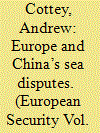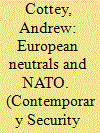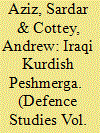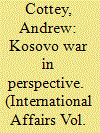|
|
|
Sort Order |
|
|
|
Items / Page
|
|
|
|
|
|
|
| Srl | Item |
| 1 |
ID:
064918


|
|
|
| 2 |
ID:
168966


|
|
|
|
|
| Summary/Abstract |
China’s disputes with its South East Asian neighbours and Japan in the South and East China Seas have emerged as important tests of the implications of China’s rise, posing dilemmas not just for regional states but also for other global actors, including European states and the European Union (EU). European responses to these disputes have pulled in three directions: a normative approach emphasising the resolution of disputes within the framework of international law; a power balancing approach, led by France and the United Kingdom, involving support for freedom of navigation operations and strengthened bilateral and EU ties with other Asian states; and de facto acquiescence to Chinese advances in the region. In terms of understanding EU foreign policy, this case suggests a sequence: a normative approach as the initial default EU policy; a turn to power balancing when the effectiveness of that policy is called into question, but also the possibility of acquiescence and consequent divisions amongst EU member states. Europe faces dilemmas in balancing support for the United States, Japan and the South-East Asian states with its strategic partnership with China, but in practice European policy is much closer to that of the former group than that of Beijing.
|
|
|
|
|
|
|
|
|
|
|
|
|
|
|
|
| 3 |
ID:
124993


|
|
|
|
|
| Publication |
2013.
|
| Summary/Abstract |
This article provides a comparative analysis of relations between the European neutral states - Austria, Finland, Ireland, Sweden, and Switzerland - and the North Atlantic Treaty Organization (NATO). The European neutrals have established broadly similar partnerships with NATO since the end of the Cold War, but significant variation in their relations with NATO can also be observed (the origins of which can be traced back to the Cold War and earlier). This pattern - continued non-membership of NATO, partnership with the alliance, and significant variation in terms of national relations with NATO - can be explained by a historical institutionalist perspective, combining path dependency and policy adaptation. This perspective also helps to explain why the relationship between the European neutrals is - and is likely to remain - an ambiguous partnership: policy adaptation at the elite level, implying close cooperation with NATO, sits alongside path dependency at the general public level where NATO is still viewed as representing 'public bads' such as power politics, militarism, and nuclear weapons. The deeply embedded domestic path dependency of neutrality suggests that even those states with the closest relations with NATO - Sweden and Finland - may never join the alliance. The article also argues that the neutral states' divergent patterns of engagement with NATO parallel those of NATO members with the alliance: more attention needs to be paid to the different ways in which both partners and members engage with NATO and the reasons for such differences.
|
|
|
|
|
|
|
|
|
|
|
|
|
|
|
|
| 4 |
ID:
178641


|
|
|
|
|
| Summary/Abstract |
During the war against Islamic State from 2014 to 2017 the Iraqi Kurdish Peshmerga became important local allies of the United States and its international partners, playing a significant role in the eventual defeat of Islamic State. In 2017, backed by the US and its Western allies, the Kurdistan Regional Government (KRG) agreed plans to reform and modernize the Peshmerga. This article provides an analysis of this reform process. Reform is severely constrained by two problems. First, the continuing soft civil war between Iraqi Kurdistan’s two main political parties, the Kurdish Democratic Party (KDP) and the Patriotic Union of Kurdistan (PUK), within which both parties view their maintenance of independent Peshmerga forces as central to their power and political survival. Second, the heroic-mythic status of the Peshmerga within Iraqi Kurdish society, which makes it difficult to convert the Peshmerga into a “normal” military force. Reform efforts to date have not addressed these issues. Until such time as the deep political divide between the KDP and the PUK is addressed, Peshmerga reform is unlikely to make significant progress – the military cart cannot be put before the political horse.
|
|
|
|
|
|
|
|
|
|
|
|
|
|
|
|
| 5 |
ID:
088665


|
|
|
|
|
| Publication |
2009.
|
| Summary/Abstract |
In historical perspective, the Kosovo war stands as a significant turning point. Within the Balkan region, Operation Allied Force marked the end of the nationalist wars of the 1990s and the beginning of a new phase of partnership and integration with the EU and NATO. In terms of the wider European security order, its repercussions were contradictory. NATO reasserted its role as Europe's leading security institution, yet Operation Allied Force also gave significant momentum to the EU's development as a quasi military body. Further afield, an immediate crisis erupted in Russo-western relations followed by renewed cooperation on the ground; the longer-term impact, however, was a lingering resentment in Moscow at NATO action. At the global level, meanwhile, Operation Allied Force appeared to symbolize the primacy of both American-led western power and of the liberal norms and values that underpinned the intervention. But this was arguably a high point: future global security crises would be managed in the context of the rising power of the non-western world, a more fragmented West and greater contestation over the norms that should underpin international society.
|
|
|
|
|
|
|
|
|
|
|
|
|
|
|
|
| 6 |
ID:
061073


|
|
|
| 7 |
ID:
052863


|
|
|
|
|
| Publication |
Oxford, Oxford University Press, 2004.
|
| Description |
84p.
|
| Series |
Adelphi paper, 365
|
| Standard Number |
0198566530
|
|
|
|
|
|
|
|
|
|
|
|
Copies: C:1/I:0,R:0,Q:0
Circulation
| Accession# | Call# | Current Location | Status | Policy | Location |
| 048312 | 355.41/COT 048312 | Main | On Shelf | General | |
|
|
|
|
|
|
|
|
|